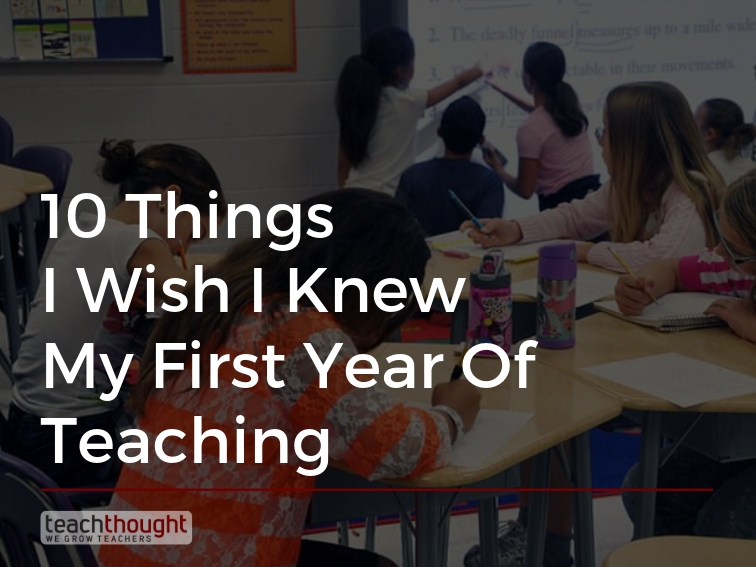What I Wish I Knew My First Year Of Teaching
by Terry Heick
My first year of teaching was a blur.
At the time, it didn’t feel like a blur. It felt a joyous, adrenaline-fueled rush of lessons, meetings, and new relationships. But in hindsight, it was definitely a blur. And now, years later, I can see a few simple tweaks would’ve gone a long way.
1. Prioritize—and then prioritize again.
You can’t do it all. You can’t save everyone. You can’t change the world, your school, department, or even (the entirety of) your classroom in one year.
If I’d have known that, I’d have started with what I absolutely had to get done, and worked backwards from there.
2. It’s not your classroom.
It felt like my classroom. Name on the doorway, students coming to my room, my name on the rotation for bus duty, district walkthroughs holding me accountable.
Philosophically, it was really more the classroom for the students, but even that isn’t entirely correct. It’s really the state or district’s classroom. At the end of the day, in lieu of all of your training, development, and instincts, your job—or my job, rather—was to implement the school and district’s policies to the best of my ability while leading the students to mastery of the national standards.
Not endearing, but true.
That doesn’t mean you can’t–or aren’t expected to–do all that you can to provide a compelling and progressive learning experience for your students, but if pursuit of that started to collide with school and district ‘non-negotiables’–as it often did–that perspective would’ve helped.
It wouldn’t have dismissed me from personal or professional accountability, but it’d have helped me internalize that friction much more fluidly.
3. Students won’t always remember the content, but many will never forget how you made them feel.
One day, you’ll just be the blurry face in an adult’s memory. They’ll likely not remember how a poet used symbolism to establish a harsh tone in a poem, and they may not remember you, but they’ll never forget how you made them feel about themselves.
4. Get cozy with the school custodians, secretary, librarian, etc.
You’ll need them.
5. Longer hours isn’t sustainable.
Change your habits and workflow instead. But you couldn’t have convinced me. All the teachers I saw lugged papers and gradebooks with them everywhere, so I thought I had to as well. Silly me.
See also How To Make Teaching More Sustainable
6. Student behavior is a product.
Classroom management is more about the design of learning experiences than it is behavior. I was given several trainings in the school “classroom management system,” but didn’t understand that ‘behavior’ was almost always a product of the way I designed learning experiences mixed with my relationship with the students.
See also What Standardized Tests Really Measure
That’d have been nice to know.
7. Don’t get sucked into doing too much outside of your class.
But if you feel the need to be involved, do so with both feet. I did the best I could with Academic Team my first year of teaching, but in reality, the students deserved ten times the support I gave them.
8. Help other teachers.
Because you’re going to need them. So much is beyond your control, and it is your relationship with your colleagues that will sustain you when you’re behind or confused. I focused so much on curriculum, instruction, and the students themselves that I neglected this part. If you want to go fast, go alone; if you want to go far, go together.
A part of this is to recognize and, to a degree, distance yourself from overtly (or toxic) teachers. Teaching is hard–and strong teaching even more difficult. It can unforgiving and exhausting and many teachers ‘stay too long.’ Whether they can’t change careers or don’t want to, a small percentage of teachers beconme jaded and negative.
The effects of this kind of educator–especially one with years of experience in a school and credibility with adminstators who are blind to the effects of the negativity–can’t be overstated. Lift other teachers up and allow yourself to be lifted up, as well. Everything else is a (sometimes dangerous) distraction.
See also What Happened When I Tried To Teach Alone
9. Reaching students emotionally matters. A lot.
Relationships start with being authentic to students and helping them to feel understood–not respect, clear rules, and seating arrangements. Yay for having things completely backward! How effective simply reaching students on a human, emotional level is depends on a range of factors. But for me, in the classroom it was the foundation for everything I did.
10. Literacy is everything for academic performance.
If students struggle reading and writing, everything else is a challenge.
10 Things I Wish I Knew My First Year Of Teaching; image attribution flickr user britishcouncilesignapore

